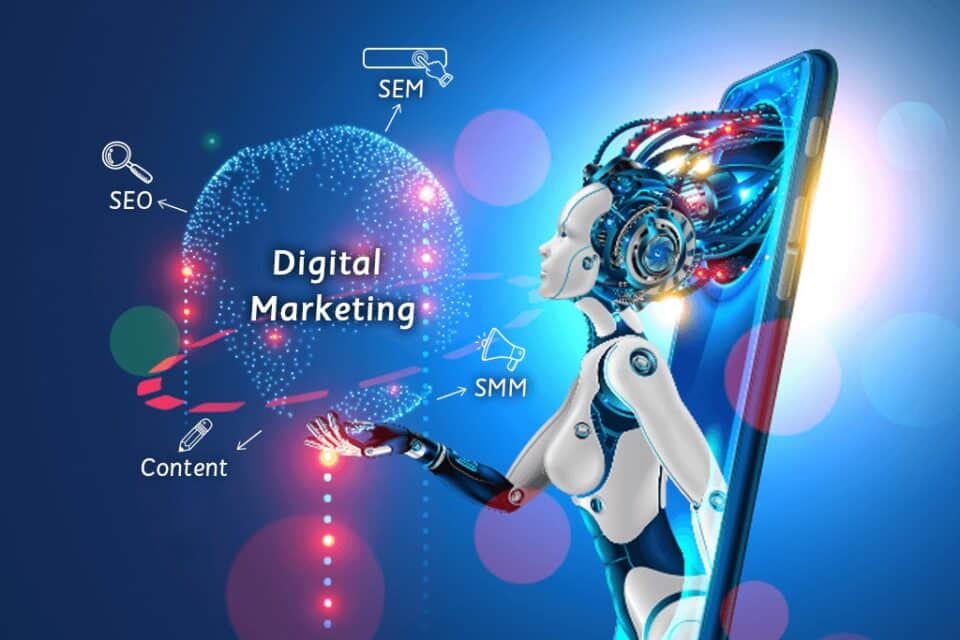In today’s ever-evolving digital landscape, incorporating artificial intelligence (AI) into digital marketing has become increasingly essential. AI has the potential to revolutionize the way we interact with customers, optimize campaigns, and achieve better results. As we look ahead to 2024, it’s crucial to understand how to harness the power of AI and integrate it seamlessly into our digital marketing strategies.
Table of Contents
AI Marketing Trends for 2024
Refinement of ad targeting:
AI algorithms have proven to be incredibly effective in targeting the right audience at the right time. In 2024, we can expect even more sophisticated AI-driven ad targeting systems, enabling marketers to reach a highly specific target audience and maximize their ad spend.
Improved AI marketing automation:
Automation is key to streamlining marketing processes and maximizing efficiency. AI-powered automation tools will continue to advance in 2024, enabling marketers to automate repetitive tasks such as email campaigns, social media scheduling, and data analysis.
More capable chatbots:
Chatbots have become increasingly popular for providing instant customer support and improving the user experience. In 2024, chatbots powered by AI will become even smarter, enhancing customer satisfaction by delivering personalized responses and resolving queries more effectively.
More efficient content creation:
AI technologies like natural language processing (NLP) can generate high-quality content at scale. In 2024, we can expect improved AI tools that can generate engaging blog posts, social media captions, and product descriptions, helping marketers save time and effort in content creation.
How to Use AI with Digital Marketing in 2024
Harnessing AI for creativity and efficiency:
AI can assist marketers in generating innovative campaign ideas and optimizing creative assets. By utilizing AI tools, marketers can gain insights into consumer preferences, automate A/B testing, and optimize ad designs for maximum impact.
AI-powered SaaS tools for marketing:
In 2024, AI-powered software-as-a-service (SaaS) tools will continue to dominate the digital marketing landscape. These tools can help marketers with various tasks, such as predictive analytics, SEO optimization, social media management, and lead generation.
Examples of successful AI integration in marketing:
Case studies and real-life examples of successful AI integration in marketing campaigns can serve as inspiration and guidance. Analyzing successful campaigns implemented by industry leaders can provide valuable insights into leveraging AI effectively for different marketing objectives.
Benefits of AI in Digital Marketing
Personalization: AI technology enables marketers to deliver highly personalized experiences by analyzing customer data and behavior. By tailoring content and offers to individual preferences, marketers can enhance customer satisfaction, drive engagement, and increase conversion rates.
Enhanced customer experience:
AI-powered chatbots, voice assistants, and recommendation engines can significantly improve the customer experience. These tools can provide instant support, offer personalized recommendations, and simplify purchasing processes, creating a seamless user journey.
Improved efficiency and ROI:
AI automation tools can optimize repetitive tasks, reduce manual effort, and improve campaign performance. By leveraging AI algorithms to analyze data, marketers can gain actionable insights, optimize targeting, and allocate budgets more effectively, leading to improved return on investment (ROI).
Challenges and Ethical Considerations Surrounding AI in Digital Marketing
Impact on employment and jobs:
One of the challenges of digital marketing with ai is the potential impact on the job market. As AI automates certain tasks, some jobs may become obsolete. It’s important for marketers to upskill and adapt to the changing landscape to remain relevant.
Data privacy concerns:
Utilizing AI in digital marketing involves processing and analyzing large amounts of customer data. Marketers must prioritize data privacy and ensure compliance with regulations such as GDPR. Implementing robust security measures and obtaining explicit user consent are crucial for maintaining trust and protecting sensitive information.
Ensuring ethical use of AI in marketing:
Marketers should be mindful of ethical considerations when utilizing AI. Transparency in AI-powered decision-making and avoiding discriminatory practices are essential. Ethical marketing practices help foster trust, strengthen brand reputation, and enhance long-term customer relationships.
Also Read: Unlocking Success: The Transformative Role of AI in Digital Marketing
Conclusion
As we look towards the future of digital marketing in 2024, integrating AI into our strategies will undoubtedly play a significant role. By staying updated with the latest AI marketing trends, harnessing AI tools effectively, and understanding the benefits and ethical considerations, marketers can unlock new possibilities and drive successful campaigns in the AI-driven digital landscape.
Incorporating AI into your digital marketing strategy in 2024 will empower your brand to deliver personalized experiences, enhance customer satisfaction, and achieve better results. Stay ahead of the curve by embracing the transformative potential of AI and leveraging it effectively in your digital marketing efforts.

